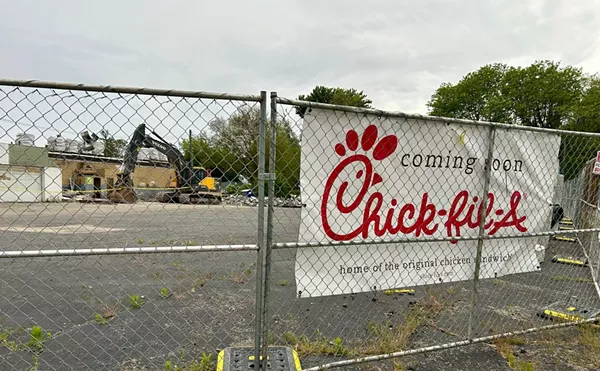Body vs. soul food
Eating low on the hog may not be good for you, and fresh food folks can help

Audio By Carbonatix
[
{
"name": "GPT - Leaderboard - Inline - Content",
"component": "35519556",
"insertPoint": "5th",
"startingPoint": "3",
"requiredCountToDisplay": "3",
"maxInsertions": 100,
"adList": [
{
"adPreset": "LeaderboardInline"
}
]
}
]
My mom made some of the best Southern-style fried chicken I ever ate. After church dinners that featured her crispy, golden yard birds, Mom would often have to pass her recipe on to other church ladies.
Growing up, I ate all the staples of the soul food diet — pork chops, pig feet, ham hocks, greens, assorted beans, macaroni and cheese — most of it cooked with requisite amounts of lard or Crisco. We ate low on the hog, high on the hog, and hogs in general. Once in a while Dad would bring home a half of a hog’s head and mom would make head cheese. I loved that spicy, gelatinous concoction. I would buy pickled pig feet from the big jar that sat on the counter at Mr. Robinson’s store on the corner of Myrtle and 18th Street in Detroit. He’d wrap it in butcher paper, and I’d stand outside and happily suck on the vinegary fat and gristle.
I know I’m not the only one who can rhapsodize about soul food. And many of you recently had your special New Year’s soul food dishes. You had Hopping John (black-eyed peas cooked with cubed fatback or ham hocks) for good fortune and prosperity. You had collard greens (overcooked and with salt pork or ham hocks) to encourage green in your wallet. There was a pork entrée (chops) to encourage family bonds. Maybe you had macaroni and cheese, sweet tea chock-full of processed white sugar or banana pudding.
Stop! Every one of those foods represents the antithesis of the purported reason for eating them. Hopping John won’t bring you good luck. It will bring you bad health. The collard greens will take the green out of your wallet when you pay your doctor’s bills. The pork will not encourage family bonds; it will kill your family members.
Soul food is the residual culinary expression of a slavery and poverty diet. Leftover parts of animals — pig intestines, feet, tails — and vegetables that were unpopular or considered weeds (okra, greens) were eaten for survival. Enslaved people took what was available and, with the help of unhealthy amounts of salt and sugar, made something that tasted good. When slavery ended, most blacks were too poor to afford anything else, and by then most had grown accustomed to and indeed preferred the foods their mamas had fed them. It’s championed as a part of the culture. Soul food is comfort food for the vast majority of African-Americans. If you doubt that, take a look at the repast served up at any black church function.
Filmmaker Bryon Hurt is finishing up a documentary titled Soul Food Junkies. The title is appropriate because people are indeed addicted to the fat, salt and sugar in this cuisine. Jersey-based Hurt is the same guy who made the 2006 documentary Hip Hop: Beyond Beats and Rhymes, which examines gender roles, misogyny and homophobia in hip-hop culture. He is currently seeking funds to finish Soul Food. This project comes on the heels of Chris Rock’s Good Hair, chronicling issues and attitudes about hair culture in the black community. Maybe there’s something going on with black filmmakers turning the camera on issues that were pretty much taboo in the past. I mean, isn’t it telling that the first African-American millionaire was Madame C.J. Walker, who sold products to her people for straightening their curly hair — something near and dear to the hearts of black folks.
Soul food is also near and dear to our hearts — even though it gives us heart attacks. Hurt’s project will probably hit a nerve. Even beyond the Soul Food film and television series, there’s hardly a black family film out there without a scene involving the copious eating of poison-laced victuals. Writer Stanley Crouch, in his New York Daily News column, suggests that Hurt’s film might become as widely discussed as Morgan Spurlock’s 2004 documentary Super Size Me. There’s a connection between the two. Fast food contains all the same bad stuff that soul food has. In Super Size Me, Spurlock ate nothing but McDonald’s food for a month. During this time he gained weight and his blood pressure rocketed to dangerously high levels.
African-Americans suffer disproportionately from diseases caused by a bad diet. According to statistics from the American Diabetes Association, 14.7 percent of all African-Americans have diabetes, and 25 percent of black women older than 55 have diabetes — rates nearly twice that of non-Hispanic whites. People with diabetes have an increased risk of going blind, kidney disease, heart disease, stroke, amputations and nerve damage. According to the American Heart Association 40 percent of African-Americans have high blood pressure and overall develop the malady earlier in life than whites; the disease tends to be more severe among African-Americans.
That’s why efforts to help make fresh, healthy foods more available in urban areas are so important. In Detroit, the Detroit Black Community Food Security Network and the Georgia Street Community Collective, both members of the Detroit Agricultural Network, are vital. The first point on Georgia Street’s mission statement is "to provide residents of our community with health." The strategy is to achieve this by maintaining a community garden and teaching others to start their own garden. There are also nutrition classes at the Georgia Street Community Center on Detroit’s east side, not far from city airport.
"Mostly we teach how to prepare certain dishes," says Mark Covington, who founded the community garden. "Some of it is introducing neighbors to things like kale salads, how to cook eggplant, how to cook collard greens without using a lot of pork. You can cook greens with smoked turkey, which is healthier, or without meat products at all. Pork in high quantities can cause your blood pressure to go up."
Covington is not anti-meat. He just sees health benefits in maintaining a balanced diet with a substantial amount of fresh vegetables. When he does eat meat it’s more likely to be turkey or chicken. He had gall bladder surgery in October and says that since then he’s eaten beef once and no pork at all.
"My great grandmother lived to 93," says Covington, "so you can live to an old age eating soul food, but I think it’s the way you cook it. Everybody doesn’t use fat back. Everybody doesn’t use a lot of salt and grease. ... Pay attention to what you eat and what you’re buying in the store. Pay attention to labels. Watch out for high fructose corn syrup."
It’s just past the new year and a lot of people have made resolutions to do better in their lives in 2012. Some people want to lose weight and be healthier. If that’s on your agenda, then this is a good time to plan a garden, maybe talk to your neighbors about doing it together. Having fresh produce around is the first step in actually eating it. Feeding it to your children gets them into the habit of eating healthier, and maybe that habit will follow them to adulthood. Eating soul food certainly does.
I’m looking forward to this Soul Food documentary and hope it spurs a lot of healthy conversation. Sometimes talking about food is almost as good as actually eating it. When the conversation is about eating healthier, that’s even better.
See the trailer for Soul Food Junkies at bhurt.com.






